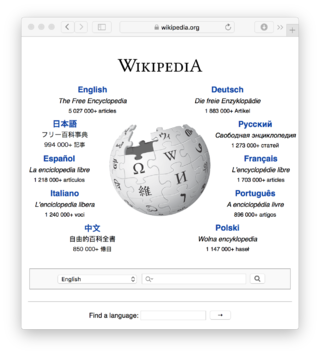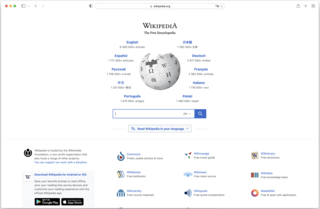
Konqueror is a free and open-source web browser and file manager that provides web access and file-viewer functionality for file systems. It forms a core part of the KDE Software Compilation. Developed by volunteers, Konqueror can run on most Unix-like operating systems. The KDE community licenses and distributes Konqueror under GNU GPL-2.0-or-later.

Wiki software is collaborative software that runs a wiki, which allows the users to create and collaboratively edit pages or entries via a web browser. A wiki system is usually a web application that runs on one or more web servers. The content, including previous revisions, is usually stored in either a file system or a database. Wikis are a type of web content management system, and the most commonly supported off-the-shelf software that web hosting facilities offer.

A web browser is an application for accessing websites and the Internet. When a user requests a web page from a particular website, the browser retrieves its files from a web server and then displays the page on the user's screen. Browsers are used on a range of devices, including desktops, laptops, tablets, and smartphones. In 2020, an estimated 4.9 billion people have used a browser. The most used browser is Google Chrome, with a 65% global market share on all devices, followed by Safari with 18%.
A web directory or link directory is an online list or catalog of websites. That is, it is a directory on the World Wide Web of the World Wide Web. Historically, directories typically listed entries on people or businesses, and their contact information; such directories are still in use today. A web directory includes entries about websites, including links to those websites, organized into categories and subcategories. Besides a link, each entry may include the title of the website, and a description of its contents. In most web directories, the entries are about whole websites, rather than individual pages within them. Websites are often limited to inclusion in only a few categories.

Maxthon is a freeware web browser, created by JeffChen in Singapore. It is available for Windows, macOS, Linux, and as Maxthon Mobile for Android, iOS, and Windows Phone 8. Since version 6, Maxthon is based on Chromium.
This is a comparison of both historical and current web browsers based on developer, engine, platform(s), releases, license, and cost.

Minimo was a project to create a version of the Mozilla web browser for small devices like personal digital assistants and mobile phones.
Social bookmarking is an online service which allows users to add, annotate, edit, and share bookmarks of web documents. Many online bookmark management services have launched since 1996; Delicious, founded in 2003, popularized the terms "social bookmarking" and "tagging". Tagging is a significant feature of social bookmarking systems, allowing users to organize their bookmarks and develop shared vocabularies known as folksonomies.
Mozilla Firefox has features that allow it to be distinguished from other web browsers, such as Chrome and Internet Explorer.

Sleipnir is a tabbed web browser developed by Fenrir Inc. The browser's main features are customization and tab functions. It supports HTML5 and multiple layout engines.

A search engine is a software system that finds web pages that match a web search. They search the World Wide Web in a systematic way for particular information specified in a textual web search query. The search results are generally presented in a line of results, often referred to as search engine results pages (SERPs). The information may be a mix of hyperlinks to web pages, images, videos, infographics, articles, and other types of files. Some search engines also mine data available in databases or open directories. Unlike web directories and social bookmarking sites, which are maintained by human editors, search engines also maintain real-time information by running an algorithm on a web crawler. Any internet-based content that cannot be indexed and searched by a web search engine falls under the category of deep web.
In the context of the World Wide Web, a bookmark is a Uniform Resource Identifier (URI) that is stored for later retrieval in any of various storage formats. All modern web browsers include bookmark features. Bookmarks are called favorites or Internet shortcuts in Internet Explorer and Microsoft Edge, and by virtue of that browser's large market share, these terms have been synonymous with bookmark since the First Browser War. Bookmarks are normally accessed through a menu in the user's web browser, and folders are commonly used for organization. In addition to bookmarking methods within most browsers, many external applications offer bookmarks management.

This article details features of the Opera web browser.

SharePoint is a web-based collaborative platform that integrates natively with Microsoft 365. Launched in 2001, It allows organisations to create, manage, and share content and resources. It's often used for building intranet portals, document management, and team collaboration spaces. The platform integrates with Microsoft Office and offers features like workflow automation, data storage, and business intelligence tools. It's highly customizable, enabling businesses to tailor the experience to meet specific needs and industry requirements. With SharePoint Online, businesses can access company data from anywhere, facilitating remote work and improving productivity.. SharePoint was built for content management and team interaction and has integrated AI functionalities.

Mozilla Firefox 2 is a version of Firefox, a web browser released on October 24, 2006 by the Mozilla Corporation.

Google Chrome is a cross-platform web browser developed by Google. It was first released in 2008 for Microsoft Windows, built with free software components from Apple WebKit and Mozilla Firefox. Versions were later released for Linux, macOS, iOS, and also for Android, where it is the default browser. The browser is also the main component of ChromeOS, where it serves as the platform for web applications.

ApexKB, is a discontinued free and open-source script for collaborative search and knowledge management powered by a shared enterprise bookmarking engine that is a fork of KnowledgebasePublisher. It was publicly announced on 29 September 2008. A stable version of Jumper was publicly released under the GNU General Public License and made available on SourceForge on 26 March 2009.

Dooble is a free and open-source web browser that was created to offer improved privacy for users. Currently, Dooble is available for FreeBSD, Linux, macOS, OS/2, and Windows. Dooble uses Qt for its user interface and abstraction from the operating system and processor architecture. As a result, Dooble should be portable to any system that supports OpenSSL, POSIX threads, Qt, SQLite, and other libraries.









